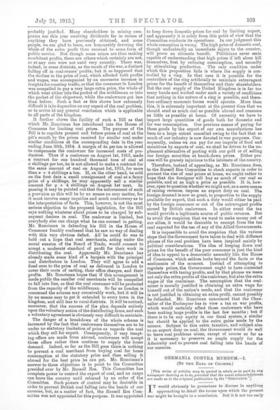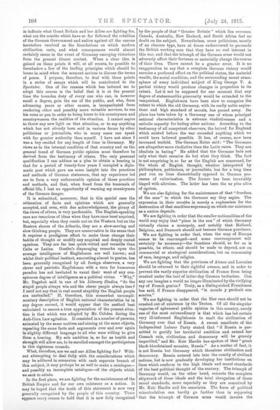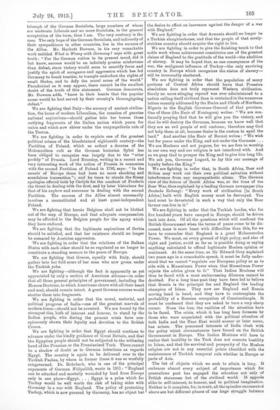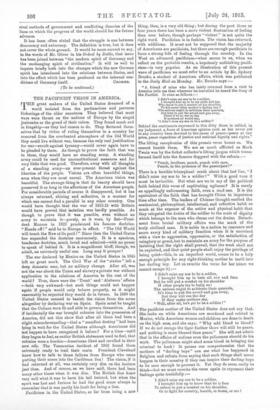[This series of articles may be 'quoted in whole or
in part by any newspaper desiring so to do, provided that the usual acknowledgments are made as to the original pubtication by the "SrEcrwron."]
IT would obviously be premature to discuss in anything approaching to detail the terms upon which the present war might be brought to a conclusion. But it is not too early
io indicate what Great Britain and her Allies are fighting for, what are the results which have so far followed the rebellion of the German Government and nation against all the canons heretofore received as the foundations on which modern civilization rests, and what consequences would almost certainly ensue in the event of Germany emerging victorious from the present titanic contest. When a clear idea is gained on these points it will, at all events, be possible to foreshadow a few of the leading principles which should be borne in mind when the moment arrives to discuss the terms of peace. I propose, therefore, to deal with these points in a series of essays which will be contributed to the Spectator, One of the reasons which has induced me to adopt this course is the belief that it is at the present time the bounden duty of every one who can, in however small a degree, gain the ear of the public, and who, from advancing years or other causes, is incapacitated from rendering other and possibly more valuable services, to use his voice or pen in order to bring home to his countrymen and countrywomen the realities of the situation. I cannot aspire to throw any new light on that situation, or to say anything which has not already been said in various forms by other politicians or journalists, who in many cases can speak with far greater authority than myself. I have not since I was a boy resided for any length of time in Germany. My views as to the internal condition of that country and on the general trend of German public opinion must therefore be derived from the testimony of others. The only personal qualification I can adduce as a plea to obtain a hearing is that for a period of twenty-four years I occupied a diplo- matic post which gave me some insight into the practices and methods of German statesmen, that my experience led me to form a very unfavourable opinion of those practices and methods, and that, when freed from the trammels of official life, I lost no opportunity of warning my countrymen of the German danger.
It is submitted, moreover, that in this special case the reiteration of facts and opinions which are generally accepted, and even, with due acknowledgment, the piracy of the views of others, is very pardonable. The English-speaking race are tenacious of ideas when they have once heart acquired, but, especially when they reside not on the Western but on the Eastern shores of the Atlantic, they are a slow-moving and slow•thinking people. They are conservative in the sense that it requires a prodigious effort to make them change their habits of thought or modify any acquired and deeply rooted opinions. They are far less quick-witted and versatile than Celts or Latins. Goethe's disparaging remarks upon the average intelligence of Englishmen are well known ; and whilst their political instinct, amounting almost to genius, has been generally recognized by all foreign observers, a very clever and patriotic Englishman with a turn for humorous paradox has not hesitated to vaunt their want of any con- spicuous degree of intelligence as a political virtue. " Why," Mr. Bagehot said in one of his Literary Studies, "do the stupid people always win and the clever people always lose I need not say that in real sound stupidity the English people are unrivalled." If, therefore, this somewhat uncompli- mentary description of English national characteristics be in any degree correct, it would appear that the method best calculated to ensure a true appreciation of the present situa- tion is that which was adopted by Mr. Cobden during the Anti-Corn Law agitation. It consisted in a number of persons, animated by the same motives and aiming at the same objects, repeating the same facts and arguments over and over again in slightly different language to all who were willing to give them a hearing. My sole ambition is, so far as health and strength will allow me, to be enrolled amongst the participators in this righteous crusade.
What, therefore, are we and our Allies fighting for? With- out attempting to deal fully with the considerations which may be adduced in connexion with each separate branch of this subject, it may perhaps be as well to make a catalogue— and possibly an incomplete catalogue—of the objects which we seek to attain.
In the first place, we are fighting for the maintenance of the British Empire and for our own existence as a nation. It may be hoped that the truth of this statement is now very generally recognized by the people of this country. There appears every reason to hold that it is now fully recognized
by the people of that "Greater Britain" which lies overseas. Canada, Australia, New Zealand, and South Africa feel no doubt on the subject. Nevertheless, some politicians, mostly of an obscure typo, have at times endeavoured to persuade the British working men that they have no real interest in this war, and that the triumph of the German arms would not adversely affect their fortunes or materially change the course of their lives. There cannot be a greater error. It is no exaggeration to say that a complete German victory would exercise a profound effect on the political status, the material wealth, the social condition, and the surrounding moral atmo- sphere of every individual subject of King George V. A partial victory would produce changes in proportion to its extent. Let it not be supposed for one moment that any degree of statesmanlike generosity would be extended to the vanquished. Englishmen have been slow to recognize the extent to which the old Germany, with its really noble aspira- tions and high standard of morals, has passed away. Its place has been taken by a Germany one of whose principal national characteristics is extreme vindictiveness and a catholic capacity for hating other nations. According to the testimony of all competent observers, the hatred for England which existed before the war exceeded anything which we could have believed possible. It has, of course, now been increased tenfold. The German Heine said: " The Germans are altogether more vindictive than the Latin races. They are idealists in hating." He added that the Germans hate not only what their enemies do but what they think. The fact is not surprising in so far as the English are concerned, far• the whole of English thought, whether interpreted by philosophers, politicians, or journalists, has for a long time past run on lines diametrically opposed to German pro- ceases of ratiocination. The former has been invariably tinged with altruism. The latter has been the ne plus ultras of egoism.
We are also fighting for the maintenance of that " freedom of the seas" to which the Germans say they aspire. The expression in their mouths is merely a euphemism for the destruction of that maritime supremacy on which our existence as a. nation depends.
We are fighting in order that the smaller nationalities of the world may enjoy that "place in the sun" of which Germany virtually claims a monopoly, and notably that Holland, Belgium, and Denmark should not become German provinces.
We are fighting in order that, when the map of Europe comes to be rearranged—and some rearrangement will certainly be necessary—the frontiers should, so far as is possible, be ethnic, and should be made to depend, not on commercial or strategical considerations, but on community of race, language, and religion.
We are fighting that the provinces of Alsace and Lorraine should be returned to their rightful owners, and in order to prevent the vastly superior civilization of France from being crushed under the heel of latter-day German barbarism. Can any one imagine a world no longer illuminated by the vivifying ray of French genius Truly, as a distinguished Frenchman has said, if France disappeared, "le monde y perdrait son sourire."
We are fighting in order that the Slav race should not be crushed out of existence by the Teuton. Of all the singular vagaries of ephemeral public opinion in this country, surely one of the most extraordinary is that which has led certain very ill-informed Englishmen to exalt the civilization of Germany over that of Russia. A recent manifesto of the Independent Labour Party stated that " if Russia is per- mitted to gratify her territorial ambition and extend her Cossack rule, civilization and democracy will be gravely imperilled," and Mr. Keir Hardie has spoken of that " great black-bloodstained monster, Russia." As a matter of fact, it is not Russia but Germany which threatens civilization and democracy. Russia entered late into the comity of civilized nations, but is now gradually developing her institutions on lines which conform to the high ideals and moral standards of the best political thought of the century. The triumph of Germany would, on the other hand, connote the complete shipwreck of those ideals and the total abrogation of those moral standards, more especially as they are conceived by Mr. Keir Hardie and his associates. The force of political miscalculation can hardly go further than in supposing that the triumph of German arms would involve the
triumph of the German Socialists, large numbers of whom are moderate Liberals and no more Socialists, in the general acceptation of the term, than I am. The very contrary is the case. The only hope of the German Socialists, and indirectly of their sympathizers in other countries, lies in the success of the Allies. Mr. Harbutt Dawson, in his very remarkable work entitled What is Wrong with Germany? says with great truth : " For the German nation in its present mood, did it but know, success would be an infinitely greater misfortune than defeat, since victory would seem to sanctify force and justify the spirit of arrogance and aggression which has led Germany to break treaties, to trample underfoot the rights of small States, and to defy the moral sense of the world." Paradoxical as it may appear, there cannot be the smallest doubt of the truth of this statement. German democrats, Mr. Dawson adds, "know in their hearts that the popular cause would be best served by their country's thoroughgoing defeat."
We are fighting that Italy—the nursery of ancient civiliza- tion, the home of modern Liberalism, the creation of genuine national aspirations—should gather into her bosom those outlying fragments of the Italian nation which yearn for union and which now shiver under the unsympathetic rale of the Teuton.
We are fighting in order to expiate one of the greatest political crimes of the bloodstained eighteenth century—the Partition of Poland, which so ardent a devotee of the Hohenzollern cult as the German historian Sybel has been obliged to recognize was largely due to the "utter perfidy" of Prussia. Lord Eversley, writing in a recent and very interesting work of the action of Prussia in connexion with the second Partition of Poland in 1793, says : " In the annals of Europe there had been no more shocking and scandalous transaction "; and be tears to shreds the flimsy apologies offered both by Carlyle for the conduct of Frederic the Great in dealing with the first, and by later historians for that of his nephew and successor in dealing with the second Partition. The success of the Allies almost necessarily involves a reconstituted and at least quasi-independent Poland.
We are fighting that heroic Belgium shall not be blotted out of the map of Europe, and that adequate compensation may be afforded to the Belgian people for the agony which they have endured.
We aro fighting that the legitimate aspirations of Serbia should be satisfied, and that her existence should no longer be menaced by Austrian aggression.
We are fighting in order that the relations of the Balkan States with each other should be so regulated as no longer to constitute a standing menace to the peace of Europe.
We are fighting that Greece, equally with Italy, should gather into her fold some of her eons who now groan under the Turkish yoke.
We are fighting—although the fact is apparently as yet appreciated by only a section of American citizens—in order that all those general principles of government, including the Monroe Doctrine, to which Americans cleave with all their heart and soul, should remain intact. A great German success would shatter them into fragments.
We are fighting in order that the moral, material, and political progress of India—one of the greatest marvels of modern times—should not be arrested. We are bound by the strongest ties, both of interest and honour, to stand by the Indian people, who during the present crisis have con- spicuously shown their loyalty and devotion to the British Crown.
We are fighting in order that Egypt should continue to advance under the kindly guidance of Great Britain, and that the Egyptian people should not be subjected to the withering hand of the Prussian or the Prussianized Turk. There cannot be a shadow of doubt as to German intentions as regards Egypt. The country is again to be delivered over to the Turkish Pashas, by whom in former times it was so woefully misgoverned. Dr. Rohrbach, who is one of the principal exponents of German Weltpolitik, wrote in 1911: "England can be attacked and mortally wounded by land from Europe only in one place—Egypt. . . . Egypt is a prize which for Turkey would be well worth the risk of taking sides with Germany in a war with England. The policy of protecting Turkey, which is now pursued by Germany, has no object but
the desire to effect an insurance against the danger of a. war with England."
We are fighting in order that Armenia should no longer be a Turkish slaughterhouse, and that the people of that sorely- stricken country should acquire the right to live.
We are fighting in order to give the finishing touch to that noble work whose achievement constitutes one of the greatest claims of England to the gratitude of the world—the abolition of slavery. It may be hoped that, as one consequence of the war, the malignant influence of Turkey—the only surviving country in Europe which recognizes the status of slavery—. will be irrevocably shattered.
We are fighting in order that the population of many portions of Central Africa should learn that Prussian absolutism does not truly represent Western oivilization. Surely no more stinging reproof was ever administered to a nation calling itself civilized than is contained in the numerous lettere recently addressed by the Emirs and Chiefs of Northern Nigeria to the English Governor-General of that province. One of them (the Emir of Kontagora) writes : " We are con- tinually praying God that he will give you the victory, and that he will destroy the Germans, because we know well that they are an evil people of evil customs ; therefore may God not help them at all, because theirs is the custom to spoil the land." And another (the Emir of Bornu) writes : " We wish but for peace under the King, and not under the Germans.... We are Moslems and not pagans, for we are free to worship in our own way and our religion is not interfered with. And so we pray God to prosper the King and to give him long life. We ask you, Governor Lugard, to lay this our message of loyalty before the King."
We are fighting in order that, in South Africa, Boer and Briton may work out their own political salvation without interference from any unsympathetic aliens. The German view of the future of South Africa was, at the time of the Boer War, thus explained by a leading German newspaper (the Deutsche Zeitung): "Every work of civilization [in South Africa] built with English money must be destroyed. The land must be devastated in such a way that only the Boer farmer can live in it."
We are fighting in order that the Turkish hordes, who for five hundred years have camped in Europe, should be driven back into Asia. Of all the questions which will confront the British Government when the terms of peace come to be dis- cussed, none is more beset with difficulties than this, for we have to remember that England is a great Mohammedan Power. We must, on every ground of high policy, and also of right and justice, avoid so far as is possible doing or saying anything calculated to offend legitimate Moslem opinion or sentiment. At the same time, as Sir Edward Grey explained two years ago in a remarkable speech, it must be fully under- stood that we cannot "regulate our European policy so as to side with a Mussulman Power when that Mussulman Power rejects the advice given to it." That Indian Moslems will thus be faced with a most embarrassing dilemma cannot be doubted. For a long time past they have been led to believe that Russia is the principal foe and England the leading champion of Islam. They now see England and Russia moving hand in hand, and they have to contemplate the probability of a Russian occupation of Constantinople. It must be confessed that they are asked to turn a very sharp corner. None the less, the realities of the situation have to be faced. The crisis, which it has long been foreseen by those who were acquainted with the political situation of both India and the Near East would sooner or later occur, has arisen. The presumed interests of India clash with the policy which circumstances have forced on the British Government in Europe. The Indian Moslems will have to realize that hostility to the Turk does not connote hostility to Islam, and that the survival and prosperity of the Moslem religion are not in any essential points identified with the maintenance of Turkish temporal rule whether in Europe or parts of Asia.
The list of objects which we seek to attain is long. It embraces almost every subject of importance which for generations past has engaged the attention not only of British statesmen but of the civilized world. It appeals alike to self-interest, to honour, and to political imagination. Neither is it complete, for, in truth, all the episodes enumerated above are but different phases of one huge struggle between
rival methods of government and conflicting theories of the lines on which the progress of the world should for the future advance.
It has been often stated that the struggle is one between democracy and autocracy. The definition is true, but it does not cover the whole ground. It would be more correct to say, in the words of Mr. Oliver in his Ordeal by Battle, that issue bar been joined between "the modern spirit of Germany and the unchanging spirit of civilization." It will be well to inquire briefly both into the changes which the new German spirit has introduced into the relations between States, and into the effect which has been produced on the internal con-
ditions of Germany itself. CROMER, (To be continued.)





































 Previous page
Previous page